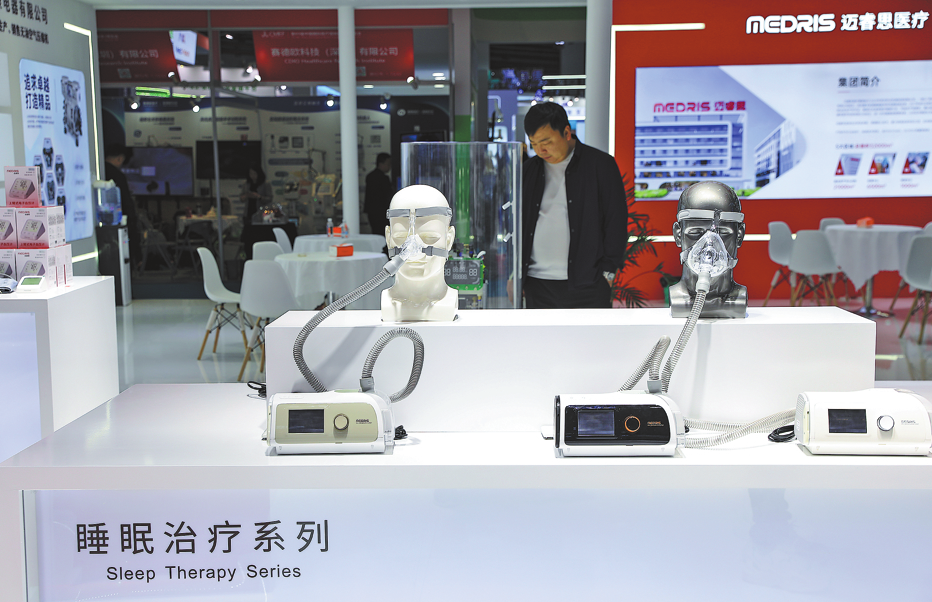Sleep woes awaken huge business potential
Sector to surpass 1 trln yuan by 2030 due to stress-related tossing and turning


The quest for a good night's sleep, once a preoccupation mainly for seniors, has found its most fervent and free-spending champions among China's younger generations. New data reveal that the country's booming sleep market is being powered not by retirees, but by the very demographic driving its modern economy: working adults aged 23 to 40.
According to a survey from data analysis provider iiMedia Research last year, 83.2 percent of all consumers in this sleep-troubled sector fall within this age bracket, dwarfing the share from all other age groups combined.
A deeper look into the figures is even more telling. While 23-to-30 year olds constitute 34.9 percent of sleep-sector consumers, the 31-to-40 cohort is the undisputed engine of growth, accounting for 48.3 percent of the sleep-deprived market, as noted by the survey.
Guan Peiying, secretary-general of the China Institute for Furnishing Industry Quality Promotion, said: "Sleep is a basic human survival skill we are all born with, but not everyone now necessarily masters. In recent years, significant changes in people's living and working habits have led many, either actively or passively, to encounter sleep troubles."
Guan pointed to habitual late nights and the immense pressure from work and life as key factors eroding sleep quality.
For these businesses, the calculus is simple. With a consumer base of hundreds of millions reporting poor sleep, the potential for business growth appears immense.
According to data from Qichacha, a business information platform, there are currently 20,000 enterprises in China registered as operating in the sleep economy.
Internet-powered healthcare platforms like Alibaba Health and JD Health are deploying digital medical services, offering online consultations for insomnia. Tech firms, including Apple with its sleep-tracking smartwatches and iFlytek with its AI-powered applications, are carving out a new "smart sleep" segment with hardware and software.
Even well known fast-moving consumer goods companies like Mengniu Dairy and lifestyle retailer Miniso are elbowing in, launching sleep-aid drinks and ambient products.
Hotel chain Atour has also been making a strategic bet on the "sleep economy". The company's latest annual report reveals a telling figure — the gross merchandise volume for its retail business hit 2.592 billion yuan in 2024, a year-on-year surge of 127.7 percent.
This explosive growth was particularly fueled by the sale of pillows, duvets and other sleep-related products directly to consumers.
The future of China's burgeoning sleep industry is coming into focus, and it is young, smart and deeply personal, said Wang Guangliang, secretary-general of the China Sleep Products Association.
"The young, digital-native consumers don't just want a product; they want a solution that is tech-integrated, tailored to their lifestyle and backed by credible data," Wang said. "This is pushing the entire supply chain toward intelligence and customization."
Smart rings that monitor sleep cycles, AI-powered apps that generate personalized soundscapes and adaptive lighting systems are moving from the periphery to the core of the product lineup. These are no longer niche gadgets for bio-hackers, but are fast becoming the expectation for a generation that manages its life through a smartphone, Wang added.
The "sleep-aid" label has become a powerful marketing tool, but its definition is dangerously vague, analysts cautioned.
"The market is developing too rapidly, with products of wildly varying quality all mixed together," said Zhu of the China Institute of New Economy.
"There is currently a lack of effective industry standards, and sector supervision urgently needs to be strengthened. Without standardized regulations, a weighted blanket is treated with the same authority as a medical device, creating chaotic scenarios where consumer protection is often an afterthought," Zhu said.




































